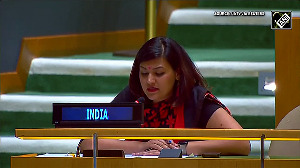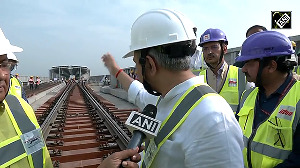Visiting Under Secretary of State Nicholas Burns brushed aside criticism that the US was trying to dictate to India on the Iran nuclear issue.
"India is a great country. It is a sovereign country. We will never try to exert ourselves in decision-making by the Indian government. We have too much respect for the Indian people and the Indian government to even contemplate that," he told television channel NDTV.
Burns, who spoke separately to some television channels and agency reporters, was asked about the clause on further restricting the transfers of equipment and technologies related to the enrichment or uranium, the reprocessing of spent nuclear fuel and the production of heavy water to specified countries including India.
"We have one policy worldwide. India is going to be treated like all other countries. This is not a specific, discriminatory statement about India," he said adding that India will get 'equitable' treatment.
Describing the bill as 'historic,' Burns said it was a big breakthrough and that the civil nuclear accord was at the symbolic centre in this new strategic partnership.
"It will allow India for the first time in three-and-a-half decades to be a full participant in a major international agreement concerning civil nuclear power. President Bush and Prime Minister Manmohan Singh were right to take this very courageous decision to break with three decades of conventional wisdom," he said.
Asked whether there were any further roadblocks in implementing the deal, he said: "I think we are over the hardest and highest hurdles. There are some steps we need to take to complete this whole process."
About Chinese reservations on the deal, Burns said: "Ultimately, China will support the bill."
On the issue of spent fuel and reprocessing, he said some negotiations were still to come in the bilateral 123 agreement to be firmed up by the two countries.
"India is going to be treated fairly and on an equal basis. There will be no discriminatory treatment of India whatsoever," he said, adding that the annual certification clause, which has been a source of worry for India, had been done away with and that the Iran issue was in no way an intrusion on the civil nuclear deal.
Burns, who held extensive parleys with Foreign Secretary Shivshankar Menon and Shyam Saran, prime minister's special envoy on the nuclear issue, affirmed that Washington will meet all the commitments made by President Bush on July 18 last year and March 2 this year.
This includes fuel assurances to India, he said.
"We now have the possibility of opening up to cooperation in nuclear fuel and nuclear technology," he said, adding: "We are not disappointed at all by the final outcome of the bill. It is an excellent agreement."
Burns said he had met some young Bharatiya Janata Party and Congress parliamentarians on Friday to brief them on key aspects of the bill.





